6 books about Documentary mass media
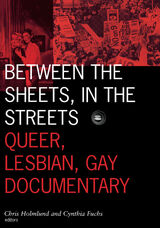
Between the Sheets, in the Streets
Queer, Lesbian, Gay Documentary
Chris Holmlund
University of Minnesota Press, 1997
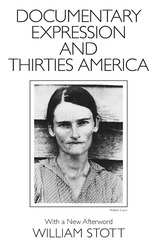
Documentary Expression and Thirties America
William Stott
University of Chicago Press, 1986
"A comprehensive inquiry into the attitudes and ambitions that characterized the documentary impulse of the thirties. The subject is a large one, for it embraces (among much else) radical journalism, academic sociology, the esthetics of photography, Government relief programs, radio broadcasting, the literature of social work, the rhetoric of political persuasion, and the effect of all these on the traditional arts of literature, painting, theater and dance. The great merit of Mr. Stott's study lies precisely in its wide-ranging view of this complex terrain."—Hilton Kramer, New York Times Book Review
"[Scott] might be called the Aristotle of documentary. No one before him has so comprehensively surveyed the achievement of the 1930s, suggesting what should be admired, what condemned, and why; no one else has so persuasively furnished an aesthetic for judging the form."—Times Literary Supplement
"[Scott] might be called the Aristotle of documentary. No one before him has so comprehensively surveyed the achievement of the 1930s, suggesting what should be admired, what condemned, and why; no one else has so persuasively furnished an aesthetic for judging the form."—Times Literary Supplement
[more]
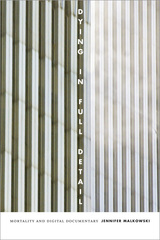
Dying in Full Detail
Mortality and Digital Documentary
Jennifer Malkowski
Duke University Press, 2017
In Dying in Full Detail Jennifer Malkowski explores digital media's impact on one of documentary film's greatest taboos: the recording of death. Despite technological advances that allow for the easy creation and distribution of death footage, digital media often fail to live up to their promise to reveal the world in greater fidelity. Malkowski analyzes a wide range of death footage, from feature films about the terminally ill (Dying, Silverlake Life, Sick), to surreptitiously recorded suicides (The Bridge), to #BlackLivesMatter YouTube videos and their precursors. Contextualizing these recordings in the long history of attempts to capture the moment of death in American culture, Malkowski shows how digital media are unable to deliver death "in full detail," as its metaphysical truth remains beyond representation. Digital technology's capacity to record death does, however, provide the opportunity to politicize individual deaths through their representation. Exploring the relationships among technology, temporality, and the ethical and aesthetic debates about capturing death on video, Malkowski illuminates the key roles documentary death has played in twenty-first-century visual culture.
[more]

Engaging with Reality
Documentary and Globalization
Ib Bondebjerg
Intellect Books, 2014
As our world becomes more globalized, documentary film and television tell more cosmopolitan stories of the world’s social, political, and cultural situation. Ib Bondebjerg examines how global challenges are reflected and represented in documentaries from the United States, the United Kingdom, and Scandinavia after 2001. The documentaries deal with the war on terror, the globalization of politics, migration, the multicultural challenge, and climate change.
Engaging with Reality is framed by theories of globalization and delves into the development of a new global media culture. It also deals with theories of documentary genres and their social and cultural functions. It discusses cosmopolitanism and the role and forms of documentary in a new digital and global media culture. It will be essential reading for those looking to better understand documentary and the new transnational approach to modern media culture.
Engaging with Reality is framed by theories of globalization and delves into the development of a new global media culture. It also deals with theories of documentary genres and their social and cultural functions. It discusses cosmopolitanism and the role and forms of documentary in a new digital and global media culture. It will be essential reading for those looking to better understand documentary and the new transnational approach to modern media culture.
[more]
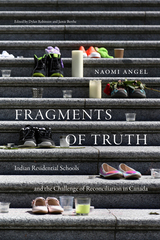
Fragments of Truth
Residential Schools and the Challenge of Reconciliation in Canada
Naomi Angel. Edited by Dylan Robinson and Jamie Berthe.
Duke University Press, 2022
In 2008, the Canadian government established a Truth and Reconciliation Commission (TRC) to review the history of the residential school system, a brutal colonial project that killed and injured many Indigenous children and left a legacy of trauma and pain. In Fragments of Truth Naomi Angel analyzes the visual culture of reconciliation and memory in relation to this complex and painful history. In her analyses of archival photographs from the residential school system, representations of the schools in popular media and literature, and testimonies from TRC proceedings, Angel traces how the TRC served as a mechanism through which memory, trauma, and visuality became apparent. She shows how many Indigenous communities were able to use the TRC process as a way to claim agency over their memories of the schools. Bringing to light the ongoing costs of transforming settler states into modern nations, Angel demonstrates how the TRC offers a unique optic through which to survey the long history of colonial oppression of Canada’s Indigenous populations.
[more]
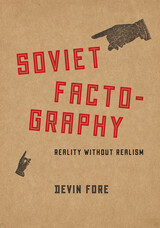
Soviet Factography
Reality without Realism
Devin Fore
University of Chicago Press, 2024
A study of Soviet factography, an avant-garde movement that employed photography, film, journalism, and mass media technologies.
This is the first major English-language study of factography, an avant-garde movement of 1920s modernism. Devin Fore charts this style through the work of its key figures, illuminating factography’s position in the material culture of the early Soviet period and situating it as a precursor to the genre of documentary that arose in the 1930s. Factographers employed photography and film practices in their campaign to inscribe facts and to chronicle modernization as it transformed human experience and society. Fore considers factography in light of the period’s explosion of new media technologies—including radio broadcasting, sound in film, and photo-media innovations—that allowed the press to transform culture on a massive scale.
This theoretically driven study uses material from Moscow archives and little-known sources to highlight factography as distinct from documentary and Socialist Realism and to establish it as one of the major twentieth-century avant-garde forms. Fore covers works of photography, film, literature, and journalism together in his considerations of Soviet culture, the interwar avant-gardes, aesthetics, and the theory of documentary.
This is the first major English-language study of factography, an avant-garde movement of 1920s modernism. Devin Fore charts this style through the work of its key figures, illuminating factography’s position in the material culture of the early Soviet period and situating it as a precursor to the genre of documentary that arose in the 1930s. Factographers employed photography and film practices in their campaign to inscribe facts and to chronicle modernization as it transformed human experience and society. Fore considers factography in light of the period’s explosion of new media technologies—including radio broadcasting, sound in film, and photo-media innovations—that allowed the press to transform culture on a massive scale.
This theoretically driven study uses material from Moscow archives and little-known sources to highlight factography as distinct from documentary and Socialist Realism and to establish it as one of the major twentieth-century avant-garde forms. Fore covers works of photography, film, literature, and journalism together in his considerations of Soviet culture, the interwar avant-gardes, aesthetics, and the theory of documentary.
[more]
READERS
Browse our collection.
PUBLISHERS
See BiblioVault's publisher services.
STUDENT SERVICES
Files for college accessibility offices.
UChicago Accessibility Resources
home | accessibility | search | about | contact us
BiblioVault ® 2001 - 2024
The University of Chicago Press









